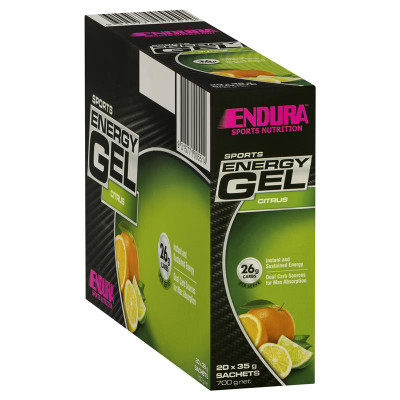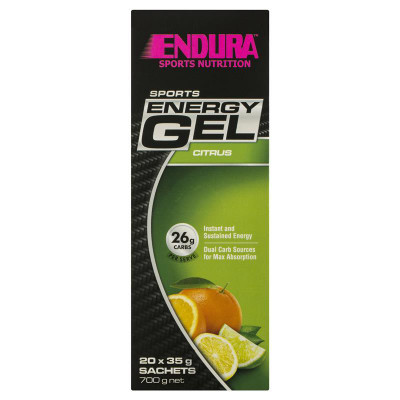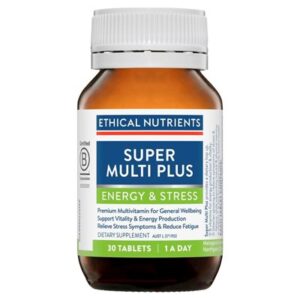Ethical Nutrients Endura Gel Citrus 35G BX20
Original price was: $49.95.$47.99Current price is: $47.99.
ALWAYS READ THE LABEL AND FOLLOW THE DIRECTIONS FOR USE
PLEASE REFER TO ANY HEALTH AND PRODUCT WARNINGS BELOW
If symptoms persist talk to your healthcare professional. This product may not be right for you. Read the warnings before purchase. Please refer to any health and product warnings below.
General Information
Endura Sports Energy Gels are a convenient and delicious concentrated energy source, providing 26g of dual source carbohydrates combined with energy boosting caffeine.
Each Gel contains 26g of immediate impact and slow-release carbs, helping you stay ahead without the crash. Carry them during training and races to conveniently maintain glycogen levels and sustain vital energy reserves all the way to the finish line.
Boxed Contents: 1 Sachet
Size: 35g Gel
KEY FEATURES
Instant and Sustained Energy Source
26g Carbohydrates per serve
Dual Carb Sources for Max Absorption
Energy Boosting Caffeine
Gluten Free
B Corp Certified
Directions For Use
For best results, consume one sachet:
– 15 mins prior to exercise.
– Every 30 mins during with fluid.
– Directly after exercise.
STORAGE INSTRUCTIONS
Store Below 30ºC.
Warnings
Do not use if sachet is torn. Flavoured gel contains caffeine. Not recommended for children, pregnant or lactating women and individuals sensitive to caffeine. It is vital to consume ample water to avoid dehydration.
Ingredients
Maltodextrin, Fructose, Purified Water, Flavour (Nature Identical 2%), Guar Gum, Xanthan Gum, Citric Acid, Potassium Chloride, Sodium Chloride, Potassium Sorbate (Preservative), Sodium Benzoate (Preservative), Caffeine.
SUSTAINABILITY
Rating: Moderate
Maltodextrin: Derived from starches like corn or wheat, the sustainability largely depends on agricultural practices. Industrial farming can have a high environmental impact, though sustainable sourcing practices can mitigate this.
Fructose: Like maltodextrin, fructose is typically derived from corn or other crops. The environmental impact of its production is closely tied to farming methods. Sustainable farming can improve its sustainability rating.
Purified Water: Water itself is a natural resource and highly sustainable when sourced responsibly. Its environmental impact is minimal unless it involves unsustainable water extraction practices.
Flavour (Nature Identical 2%): Nature identical flavors are synthetically produced to mimic natural flavors. While not as resource intensive as extracting flavors from plants, the manufacturing process of these flavors can still have environmental impacts, especially if synthetic chemicals are used.
Guar Gum: Guar gum is derived from guar beans, primarily grown in India. The sustainability depends on farming practices, such as crop rotation and water usage. Organic or sustainable farming methods could improve its sustainability.
Xanthan Gum: Produced through fermentation of sugars, the sustainability depends on the source of the sugars used and the energy consumption of the fermentation process. It’s generally more sustainable than some synthetic options, but still has an environmental footprint.
Citric Acid: Citric acid is produced through fermentation. While fermentation can be energy-intensive, it’s more sustainable than chemical alternatives. The sustainability also depends on the source of sugars used for fermentation.
Potassium Chloride: Potassium chloride is mined, often from salt deposits. Mining can have significant environmental impacts, including habitat destruction and high energy consumption. However, the process can be improved with better mining practices.
Sodium Chloride: Like potassium chloride, sodium chloride is primarily extracted from salt mines. Its sustainability rating is impacted by the mining process, which can involve habitat disruption and high energy use.
Potassium Sorbate (Preservative): This preservative is synthetically produced, often derived from petrochemical sources. The environmental impact of its production can be significant, particularly due to the energy-intensive manufacturing process.
Sodium Benzoate (Preservative): Similar to potassium sorbate, sodium benzoate is synthetic and derived from petrochemical processes. Its production also carries environmental costs due to energy-intensive processes.
Caffeine: Caffeine is sourced from coffee or tea plants, and its sustainability depends on the agricultural practices used in growing these plants. Fair trade and organic sourcing can improve sustainability, but conventional farming may involve high pesticide use and deforestation risks.
Disclaimer
PRODUCT DETAIL DISCLAIMER
Botanical Chemist Palm Cove strives to provide accurate and up-to-date product information, including images, ingredients, nutritional facts and more. However, product details may change and there may be delays in making updates. For the most accurate and current information, please refer to the product label or contact the manufacturer directly. For therapeutic goods, always read the label and follow the directions for use.
PRODUCT PRICE DISCLAIMER
Product prices are displayed based on your current location. Please be aware that prices may vary between our Botanical Chemist Palm Cove retail outlet and online store.






